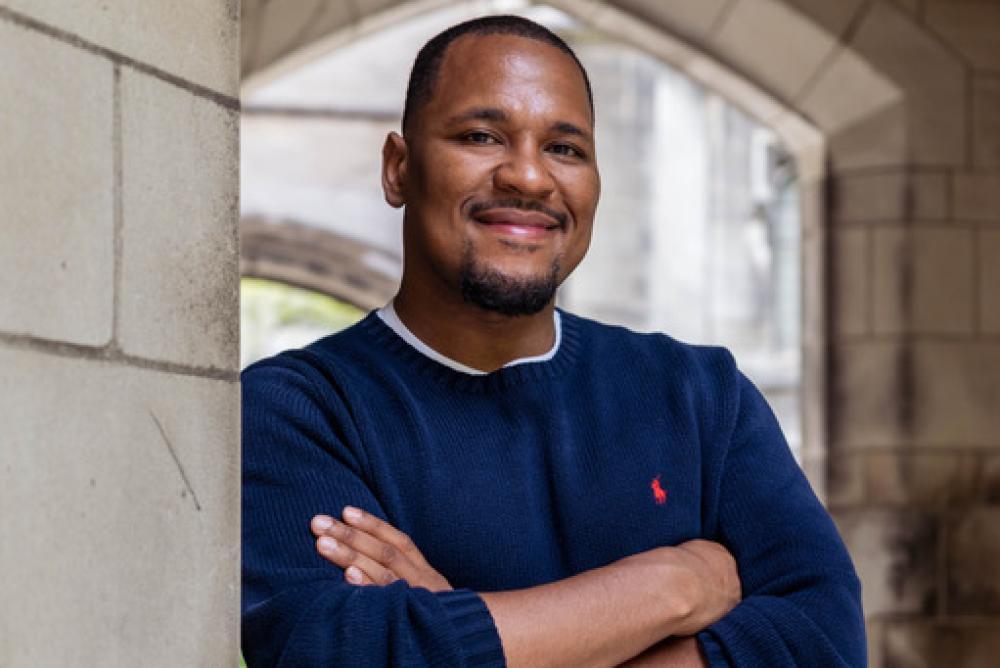Physics Events
[PAST EVENT] Physics Colloquium - Bryan Ramson
Access & Features
- Open to the public

Bryan Ramson, Associate Scientist Neutrino Division Fermilab, Title of talk: Reviewing the Physics Program of the Fermilab Modern Modular Bubble Chamber
Abstract: Long-baseline neutrino oscillation experiments present some of the most compelling paths towards beyond-the-standard-model physics through measurement of PMNS matrix elements and observation of the degree of leptonic CP violation. State-of-the-art long-baseline oscillation experiments, like NOvA and T2K, are currently statistically limited, however uncertainty in neutrino-nucleus scattering represents an important source of systematic uncertainty in future experiments like DUNE and Hyper-Kamiokande. Neutrino cross-section uncertainties can be reduced through high-statistics measurement of neutrino interactions on light nuclei, but creating a detector with an appropriate light target has proved elusive since the hydrogen bubble chambers designed in the 70’s. Modern bubble chamber-based dark matter detectors like PICO and the Scintillating Bubble Chamber have demonstrated that advances in sensor technology, computing, and automation would allow a modern bubble chamber to fully utilize the megawatt scale intensity LBNF beam. This talk will review the broad physics program and the construction of a hydrogen bubble chamber for use with neutrinos at Fermilab.
Bio: Bryan Ramson is a neutrino physicist working on the intensity frontier of high-energy particle physics. He works as an associate scientist at Fermilab, where he uses his expertise in medium and high-energy nuclear physics to improve measurements of neutrino oscillations and refine our understanding of neutrino-nucleus interactions. He is a member of two large experimental collaborations: the Fermilab NuMI Off-axis ?e Appearance (NOvA) Experiment and the upcoming Deep Underground Neutrino Experiment (DUNE), a future Fermilab experiment. When not directly supporting the measurement of neutrino oscillations, he studies neutrino-nucleus interactions in the NOvA Near Detector and leads an independent R&D project to develop a new generation of hydrogen bubble chambers. Bryan earned dual B.S.’s in Physics and Mathematics, and an M.S. in Atmospheric Sciences from Howard University in Washington, DC. He earned another M.S. and Ph.D. in Applied Physics from the University of Michigan, Ann Arbor. His doctoral work concerned the study of nuclear anti-matter and occurred as a visiting scholar on the Argonne/Fermilab particle physics experiment, E906/SeaQuest.
Bryan has a strong commitment to serving society scientifically, as well as socially. Before matriculating at Michigan, he was a visiting scholar at Earth Sciences Division of NASA Goddard from Howard University, working primarily on the measurement of cloud properties in the Baltimore-Washington corridor and the US Southern Great Plains region. He currently serves as the co-Chair of the Fermilab Saturday Morning Physics program and has engaged in various forms of community engagement around the Chicagoland area especially as it concerns science outreach and local community organizing.
Bryan is a native of New Orleans, LA, coming of age in the Seventh and Ninth Wards of the city. He currently resides in the West Garfield Park neighborhood on the West Side of Chicago, Illinois. When he is not thinking about quarks and leptons or actively working for a better future, he enjoys popular television and movies, speculative fiction, exercise, performance driving, and video games.
